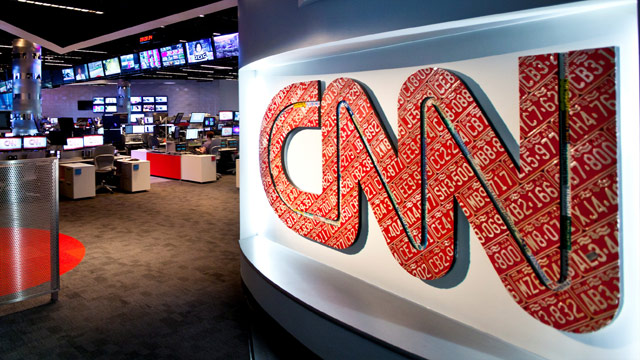Chief CNN Meteorologist Reverses Position on Climate Change

The polar ice caps may be melting and the seas slowly swallowing western Alaska, but let us breathe a collective sigh of relief now that one of the longstanding holdouts in Deniersville has decided those climate-studying scientists were right after all: the earth is heating up, and humans are indeed responsible. In a belated move of intellectual integrity and moral urgency, CNN meteorologist Chad-come-lately Myers, serving as weather correspondent for the network since 1999, has packed up his collection of old canards and put them to pasture.
It couldn’t have anything to do with Bill Nye calling him out on his own network earlier this week, could it? Surely it does — because when The Science Guy needles you on national television, you churn out an op-ed at lightning speed clarifying your views. Coincidence of timing or no, I’d like to see the two on the same side in future climate segments, matching bow ties optional. If nothing else, perhaps our howls will be slightly less exaggerated when “The Most Trusted Name in News” slides across the ticker.
And let’s not call this a miracle. Call it what happens after a sober assessment of the available evidence and a principled muzzling of self-pride. Call it an example of a hardline denier who frequently used his role as a news personality to misinform the public by attacking the anthropogenic connection to climate change setting things right. His plainspoken op-ed comes up more than a few marbles short of courageous, but it was necessary if only so those who leaned on him for their climate doubts can no longer do so.
For a time it seemed as though nothing could penetrate Myers’ Venus-thick sulfuric cloud of denial, impervious as he was to ubiquitous climate data. In a 2008 segment he insisted, “to think that we could affect weather all that much is pretty arrogant.” Two years later he carted out the tinfoil by implicating climate scientists in a mass conspiracy of corruption. On other occasions he seemed to concede the planet is warming but downplayed our role in the matter by pointing up a smorgasbord of debunked mechanisms, including sunspot activity, negative cloud feedback, and urban heat island effects. All chewed cud, unbeknownst to no one.
As someone who eroded public understanding on climate for the better part of two decades, one might expect a penitent posture or more deliberate recall of his earlier comments. But instead he briefly recounts his intellectual journey from initial skepticism to concurrence with scientific consensus. According to Myers, the evidence wasn’t in yet. Whatever keeps him from tossing and turning in the night, I suppose. He says that in the 1980s the human release of greenhouse gases had not yet emerged as a clear driver of climate change, with several other causal factors still on the table. Well, maybe the memo hadn’t yet reached undergrad meteorology programs, but his claim is largely false.
The gravity of human involvement in the climate was known at least as far back as 1965, when the first scientific report was made to President Lyndon Johnson. What’s more, the specific atmospheric agent was named in Johnson’s special address to Congress that same year: “This generation has altered the composition of the atmosphere on a global scale through radioactive materials and a steady increase in carbon dioxide from the burning of fossil fuels.” And, of course, the physical link between CO2 and climate was established long before that: since the mid-19th century thanks to the scientists Tyndall and Arrhenius.
There has always been a curious discrepancy between meteorologists and climatologists on the matter of climate change, this despite the fact that all of the major professional societies in the meteorological field have published official statements affirming the human origins of recent global warming and its future consequences. Most of these position statements have been out there since the early 2000s, including those by the World Meteorological Organization, the American Meteorological Society, and the American Geophysical Union (1999). Partisan politics notwithstanding, we had the basic picture locked down decades ago; Myers’ skepticism was no more rational in 2005 than they were last year.
Thus the question remains: if Myers cared about this issue as much as his forthright denunciations over the course of his career would seem to suggest, why shirk due diligence and ignore the published statements by the top experts in his own field? Where was this op-ed ten years ago? On the backburner while he catered to people for whom a general distrust in science comes as natural as breathing, one can only conclude.
Weather is not climate, and weathercasters are not climate scientists. But for most Americans, Myers and his on-air colleagues are probably the most visible scientists, for better or worse. And because of that, they bear a profound responsibility to stay current with developments in the broader scientific community, especially those relating to climate change, and disseminate that information accurately to the public. I imagine Bill Nye urged much the same in their off-air conversations.
Further reading:


Comments